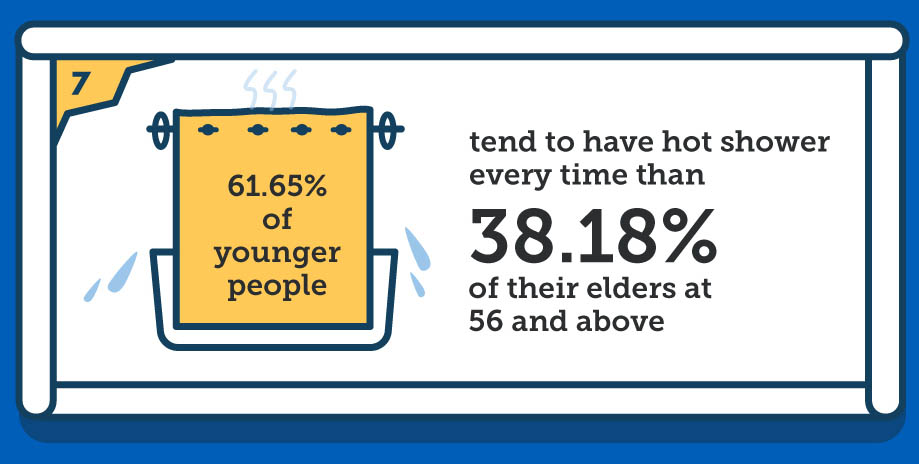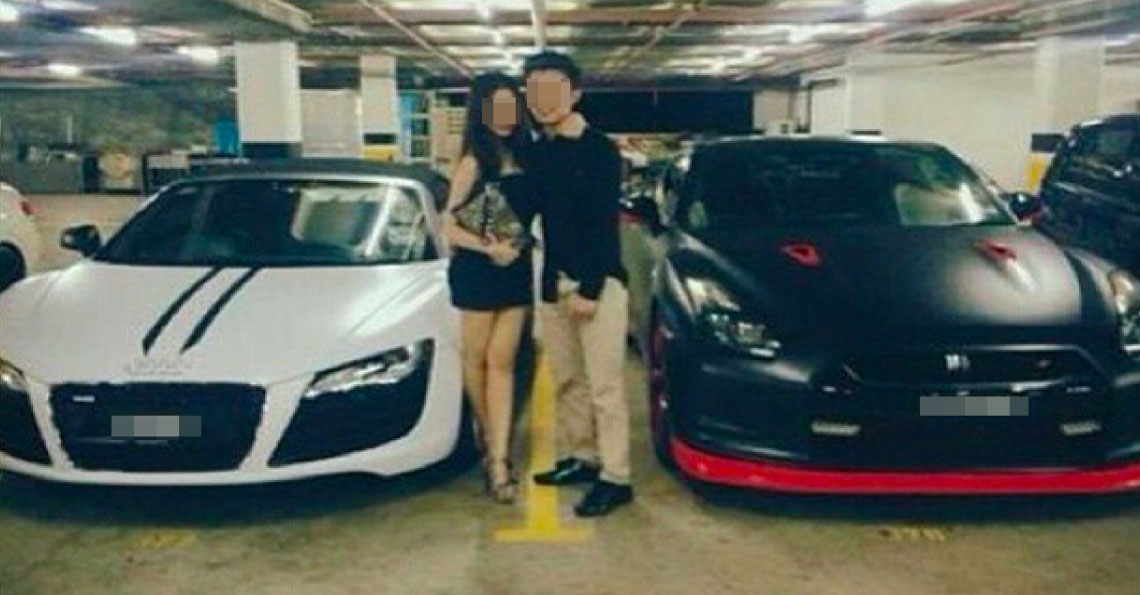Guess how many Msians use this simple trick to protect their homes from robbers

- 1.7KShares
- Facebook1.4K
- Twitter11
- LinkedIn38
- Email63
- WhatsApp161
Can you guess how much energy Malaysians use? In 2014, the World Bank recorded that Malaysians use 2,967kg energy of oil equivalent per capita. That’s a LOT of energy, considering that before in the 1980s, we were using less than a quarter of that!
So together with our friends at GE, we wanna find out just how Malaysians use electricity. Do we all sleep with the air-cond turned on? How long do we charge our phones? Are we wasting more energy than the average Malaysian??
With so many questions in mind, we decided to run our first-ever ‘Malaysian Power Gila Survey 2017‘! Before we get to the findings, some preliminary details first:
- No. of respondents: 7,688
- Survey period: 4th August – 5th September 2017
- Age group: Mostly 21 – 25 (22.42%), but with respondents across all age groups (below 17 – above 56)
- Top 5 locations: Selangor, KL, Johor, Penang, Perak. (Each state had respondents but we’d discount Perlis and Labuan as they had less than 50 respondents each)
- Gender identification: 66.8% male, 32% female, 1.2% others
Ok ready? Lesgo!
1. 58.9% think they can outsmart robbers by turning on the lights when they go out
So why do they turn on the lights? This apparently makes their house look like ‘someone’s at home’, and we can’t blame them for doing that either. Here’s why.
Did you know that in the first quarter of 2016, 6,662 house break-ins were reported to the police? While car and motorcycle thefts has gone down in Malaysia over the last three years, cases of home burglaries and snatch thievery have increased. One main reason is because thieves are getting pretty smart nowadays! They’re able to pick locks and outsmart various security systems.

And perhaps even the most canggih of all security systems isn’t as effective against intruders as compared to ‘someone being home’. It sends the message that the rob job could be a lot more complicated than they’d want.
Another interesting thing to note is that out of this number, 69.2% were guys, 29.8% were women, and 1.1% identified themselves as ‘others’.
2. Malaysian men are more kedekut in saving electricity
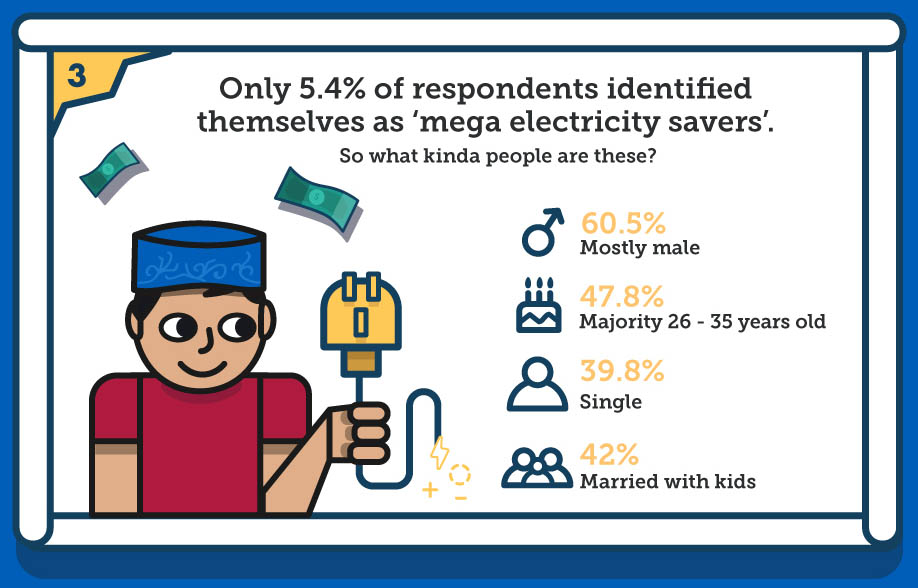
First off, most people from our survey seem to be pretty responsible when it comes to using electricity:
- 66.1% say they try not to waste it (e.g. turning off the toilet lights when they’re not in use)
- 26.9% say they’re a little more relaxed (e.g. leaving a few lights turned on in the house but making sure that they’re turned off before going out)
- Thankfully, only a tiny fraction of 1.5% say they don’t give a crap about electricity usage/wastage.
So… who’s the most kedekut when it comes to using electricity? 5.4% of our respondents considered themselves ‘mega electricity savers’ (e.g. removing ALL the plugs from sockets when they’re not in use), and turns out, most of them (60.5%) are men!
And if you think that they’re old and grumpy, think again. A majority of them (47.8%) are 26 – 35 years old and mostly have a household income of RM2,000 – RM4,000 (28.2%). And as for their marital status, we found that most of them are either single or married with kids O.O
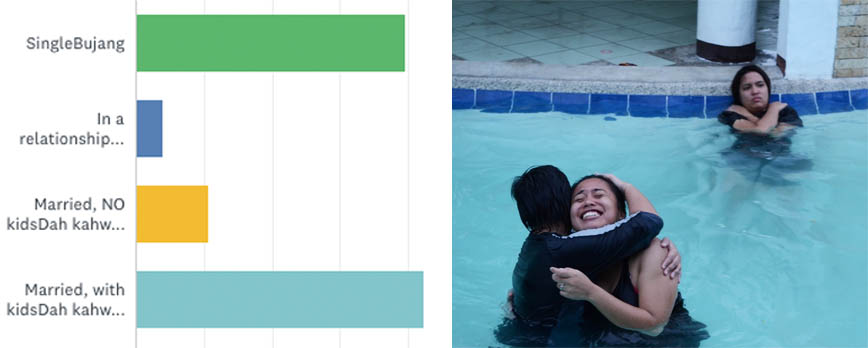
Must be something about being in a lovey-dovey honeymoon stage that makes you super oblivious to spending money 😉
3. 51% actually don’t know the main source of Malaysia’s energy!
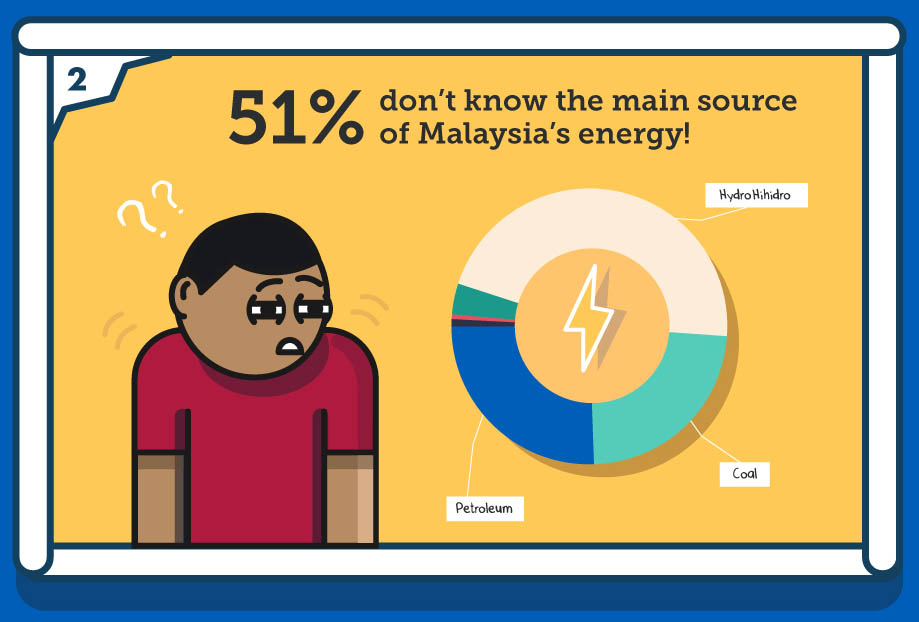
When we asked our respondents to guess our country’s main source of energy, most of them had gotten it wrong – 46.2% said hydro power, 3.5% solar power, 0.9% nuclear power, and 0.6% wind power.
In actual fact, Malaysia’s primary source of energy is still from coal (25.4%) and petroleum (23.5%)! Yes, it’s not a sustainable way of developing and managing energy, and that’s where our friends at GE come in. And did you know that Southeast Asia’s first ultracritical power-plant is in Manjung, Perak? GE actually works with TNB on the Manjung 4 power-plant, and has even managed to reduce air pollution up to 70% as compared to other units in Manjung.
4. 46% of Malaysians MUST sleep with their air-cond every night… even if it’s NOT hot
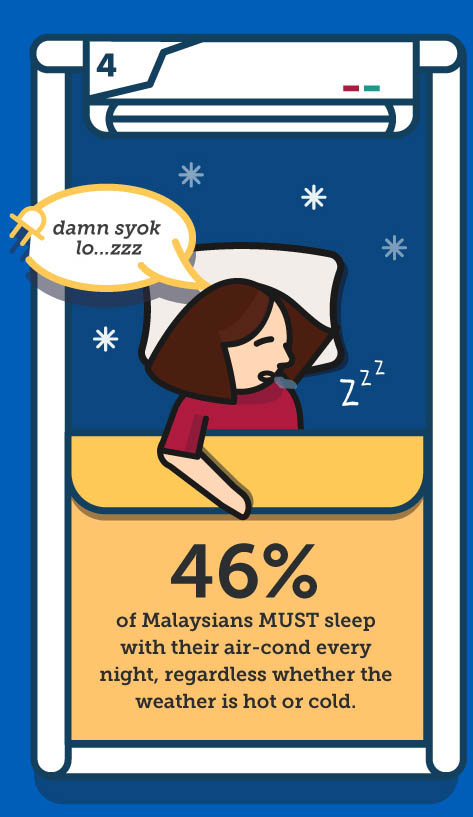
Walao! So much money to pay electric bills meh?
Turns out, more than half of them are between 21 – 35 years old (51.8%). It’s no surprise, considering that this is the generation that “has it easy” AND is already making their own money… so if fancy lattes are no big deal, maybe the same goes for air-conditioning. But what we’re more surprised is that our elders (50+) even made in into this category at 4.6%!
One thing’s for sure, air-conditioning is NOT cheap. We know cos we’ve written about it before 😀 An average 1-horsepower air-cond is about 950 Watts… so imagine using it for 8 hours every night, for a month. For the full calculation with tariff charges etc. click here, but for now:
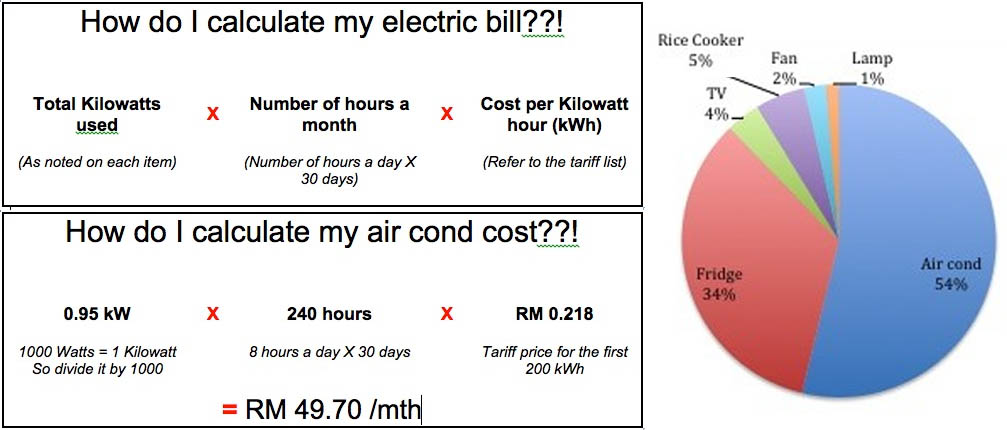
Of course, this also varies according to the temperature of your choice, as well as the process of cooling your room to said temperature. But to be more efficient in your energy usage, TNB actually suggests that you keep your filter clean so it’ll be easier for cool air to flow out, and stay at temperatures between 23°C – 25°C cos apparently it provides sufficient cooling, yet keeps the consumption low while you sleep.
Speaking of sleep….
5. More men preferred to charge their phones overnight (37.8%)
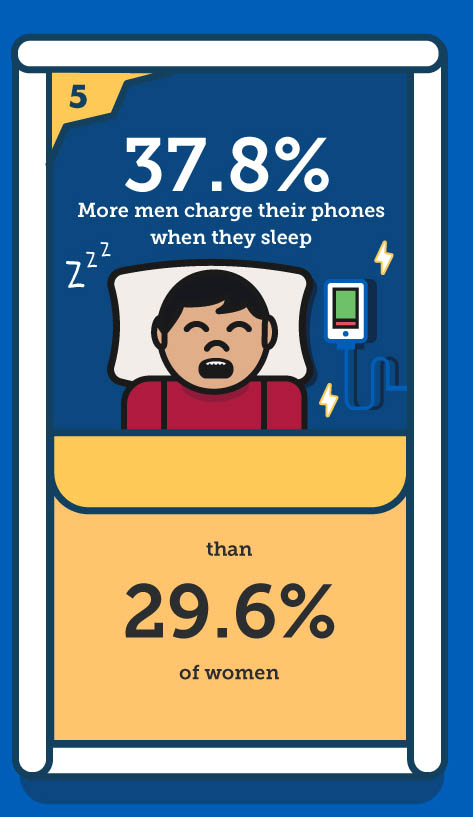
Do you charge your phone overnight? Is your phone always by your side as you sleep, plugged into the charger and ready to be 100% juiced by the time you wake up? Well you’re just like our other 35.4% respondents! Turns out, this method is more preferred by men (37.8%) than women (29.6%).

But actually, this method isn’t the most preferred way of charging phones… and having heard about the dangers of overnight charging (which is very debatable with today’s new and improved technology la, really), there’s no wonder why the majority (54.4%) charge their phones whenever it’s on low battery and remove it once it’s 100% powered.
On the other hand, 9.8% would charge their phones whenever there’s a charger nearby, REGARDLESS of battery level. Well… that’s… inconvenient.
6. Guess who has the highest electricity bills? Sabah and Pahang
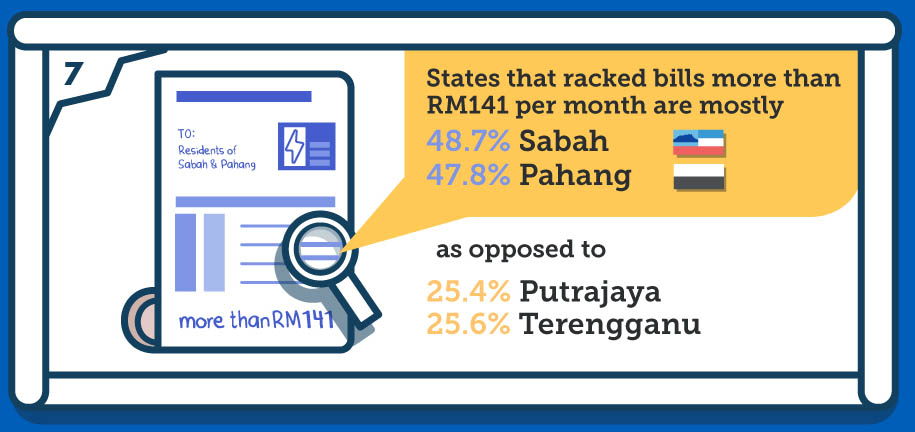
Okay we made a bit of a boo-boo. We asked our respondents how much they paid for their monthly electricity bill, and gave them these selections: Less than RM10 / RM11 – RM20 / […] / RM121 – RM140 / RM141 and above.
Turns out, an overwhelming majority of 42.5% answered RM141 and above! In retrospect, should’ve widened the scale a bit, tapi budak baru belajar tolong maafkan. So we decided to just focus on the respondents from the RM141 and above category to see if there was something interesting. Here’s what we found.
In Pahang, a majority of them (48.8%) paid RM141 and above. We can only assume that it’s because Pahang is one of the driest parts of peninsula Malaysia. Likewise with Sabah, where a majority of them (48.7%) paid RM141 and above. Not sure why… maybe because people rather use their air cond than to climb the mountain for cold air? (Lel… sorry tak lawak.)
On the other hand, in Terengganu, folks seemed to be pretty thrifty as they were the lowest (25.6%). That’s actually not that surprising… from our other questions, we found that Terengganu folk either live simple lives or are rajin to save electricity. 30.2% of them completely remove the plugs from the socket when not in use, 31.6% of them don’t own air-conditioners, and as many as 71% don’t even own water heaters! What they probably have is the ability to go through life struggles la.
Likewise with Putrajaya (25.4%), which is actually pretty surprising considering that it’s such a high-tech place!
7. The younger you are, the more you need to mandi with hot water
In general, MOST of our respondents (41.5%) do shower with hot water regardless of the weather, and 22.9% only when it’s cold. The remaining 35.6% don’t even own water heaters… which is a surprisingly a lot, but this is pretty relative and we *are* basing it on our own experiences in urban Malaysian life.
Anyway, we found that most (61.7%) of our young respondents (17 and below) had to shower with hot water all the time, regardless of weather. That means even if El Nino hits, armpits all super basah, and Syabas announces another water cut, they’ll probably still BOIL tangki water before they shower! Haiyo these youngsters ar.
Well it’s not that hot water is a bad thing la, but there are so many benefits to showering with cold water too. Hot water is known to dry your skin, whereas cold showers can do the opposite and help with split ends. But vanity aside, researchers have also found that cooler showers at 20°C can be used as a treatment for… depression?? Science.

Overall, Malaysians are pretty smart in managing energy, but…
… as with many things in life, we can improve. From our survey, it seems like a majority of our respondents actually do care about managing energy efficiently. But truthfully, it’s not mainly because they care a lot about the environment (28.9%), but because it’ll save them money (64.4%)! Only a teeny tiny fraction (5.9%) admitted that they don’t care about saving energy.
Anyway, we’re not here to nag you about using less electricity. Heck, sometimes, leaving things turned on may actually be more energy-efficient… like putting your laptops in sleep mode instead of doing a proper shut-down (the reboot uses a shockingly lot of energy). At the end of the day, there are so many resources out there to help you figure out if you’re saving or wasting energy. The key here is to be aware. 🙂
So how different are you from most Malaysians? See where you stand against the majority:
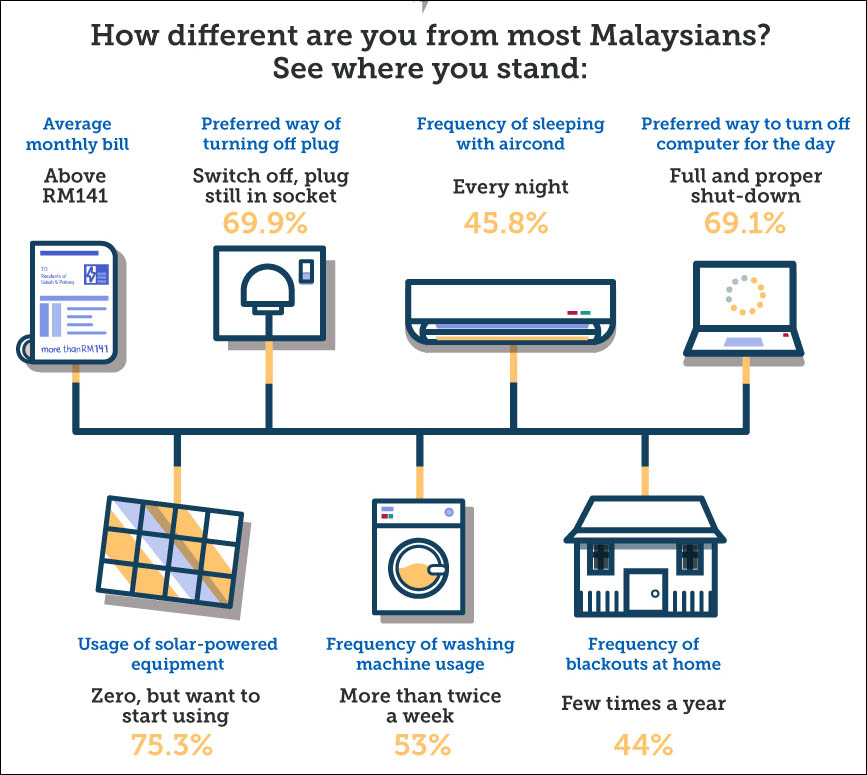
- Average monthly bill: Above RM141 (42.5%)
- Preferred way of turning off plug: Switch turned off, but plug still in the socket (69.9%)
- Frequency of sleeping with aircond: Every night 45.8%
- Preferred way to turn off computer for the day: Full and proper shut-down (69.1%)
- If they have solar-powered equipment: No, but want to start using (75.3%)
- How often they use the washing machine: More than twice a week (53%)
- How often they get blackouts at home: Few times a year (44%)
- The percentage of air-conditioning in their home: One room or only the hall (20%)
- 1.7KShares
- Facebook1.4K
- Twitter11
- LinkedIn38
- Email63
- WhatsApp161


